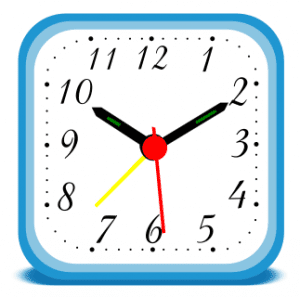 Intervals of time are generally measured in standardised units, but some historical terms cover variable units of time. A historian needs to be familiar with units of time to ensure the correct terminology is used when describing change over time.
Intervals of time are generally measured in standardised units, but some historical terms cover variable units of time. A historian needs to be familiar with units of time to ensure the correct terminology is used when describing change over time.
Most people are familiar with common units of time such as week, year or century. However, many will not understand the period of time meant by a millisecond or an eon.
To help understanding, we have described twelve standard units of time from shortest to longest. Below these we have listed some variable units of time that you might come across in history.
Standard Units of Time
Millisecond
A millisecond is one thousand microseconds
A blink of an eye takes between 100 and 400 milliseconds
Second
A second is equal to one thousand milliseconds
Jumping in the air and landing takes about a second
Minute
One minute is equal to sixty seconds
It would take about a minute to sing ‘Happy Birthday’ three times
Hour
One hour is equal to 60 minutes
A lot of television shows last for an hour (including advertisements)
Day
One day is equal to 24 hours
From midnight on Wednesday to midnight on Thursday is one day
Week
One week is equal to seven days
From midnight on Sunday to midnight the following Sunday would be one week
Fortnight
A fortnight is equal to 2 weeks or 14 days
Month
One month is equal to 31, 30 or 28 days
There are 31 days in January, March, May, July, August, October and December and 30 days in April, June, September and November. February has 28 days except in a leap year when it has 29 days.
Year
One year is equal to 12 months or 365/366 days depending on whether or not it is a leap year
There is one year between your birthdays
Decade
One decade is equal to ten years
From 1st January 1950 to 31st December 1959 would be a decade
Century
One century is equal to 100 years or 10 decades
From 1st January 1901 to 31 December 2000 is a century
Millennium
One millennium is equal to 1,000 years
From 1st January 1000 to 31st December 1999 would be a millennium
Variable Units of Time
Age
An age is a period of time that lasts the lifetime of a person or the lifetime of an object or movement
The age of discovery covers the period of exploration of new lands from around 1400 to 1700
Era
An era is a period of time, generally a number of years that have a shared characteristic
The Elizabethan era covers the period when Elizabeth I was Queen from 1558 to 1603
Epoch
An epoch begins when there is a major advancement or change. An epoch is generally longer than an era.
The Industrial Revolution marked an epoch in working lives of the people of the time. In geological terms we are currently in the Anthropocene epoch
Eon
An eon is a very long period of time of indeterminate length.
In geological terms an eon is roughly a billion years and we are currently in the Archean eon.
Citation Information:
Heather Y Wheeler. (2020 – 2022). Units of Time – A Complete Guide. Available: https://www.historykeyskills.com/units-of-time/. Last accessed July 13th, 2024

